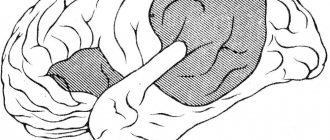We delve into the essence of the problem: why it is necessary and how to deal with stress
First of all, you should understand once and for all that stress is not a terrible monster that lurks around every corner, waiting for you with an ax at the ready.
This is a completely normal physiological reaction of the body to external circumstances or situations. In a stressful situation, blood pressure rises, consciousness becomes clearer, hormones begin to be actively released into the blood, all forces are mobilized to get out of the “risk zone” as easily and quickly as possible, and most importantly, with minimal “losses.”
Effects of stress during pregnancy
Due to stress, the body's defenses are greatly reduced. Exposure to frequent nervous conditions makes the body defenseless against various infections. Such diseases have a negative impact on a woman’s general well-being, and most importantly, they pose a threat to the fetus.
Due to hormonal changes in the body, expectant mothers are extremely sensitive to external stimuli. Here are some examples of the dangers of stress for the body of the expectant mother and her fetus:
- chronic depressive conditions;
- onset of premature labor;
- risk of miscarriage;
- an unborn child is at risk of developing chronic diseases;
- deviations in the mental and physical development of the baby after birth;
- underweight of the fetus.
Causes
The problem of constant stress is relevant in both developed and developing countries. Main causes of the condition:
- Low social status, financial situation. Man is in a constant state of struggle for a place in the sun.
- Lack of harmony in the family. The atmosphere in the house does not allow relaxation; scandals create a tense environment.
- Professional activities, relationships in the team. Unloved work, difficult tasks, constant pressure from superiors, gossip from colleagues, envy, lack of career advancement - these are just a small part of the factors of professional stress.
- Diffidence. Constant doubts, fear of mistakes, social condemnation make a person unstable to negative influences.
- Lack of communication. Conversation is not only an exchange of information, it is necessary for emotional relief.
- Intrapersonal conflicts. These include cognitive dissonance, negative self-talk, and conflict of beliefs.
Each case must be dealt with separately. For many, the reason for the tense state lies in deep childhood, old psychological traumas that led to inferiority complexes. A pessimistic attitude towards life and a conservative character reduce the body’s resistance to irritants and increase the depth of negative influence.
Stress is a normal reaction of the human body to sudden or constant stimuli. As a result, a person experiences a surge in hormones and the functioning of the cardiovascular system changes.
Rare stress strengthens a person, but with prolonged exposure to irritating factors, the body experiences moral and physical overload.
Stress, whatever it may be, greatly affects the human body. The first to suffer is the cardiovascular system. Next come the gastrointestinal tract and endocrine system. The main diseases that can be caused by chronic stress:
- angina pectoris;
- diabetes;
- hypertension;
- heart attack;
- increased acidity;
- gastritis;
- insomnia;
- stomach ulcer;
- neuroses;
- colitis;
- cholelithiasis;
- depression;
- decreased immune system.
All these diseases are the result of stressful situations. Therefore, at the first symptoms of stress, you need to contact a specialist. And to overcome stress you need to use all possible methods.
Signs of depression.
Depression is a more difficult to treat disease than stress. If you fail to recognize the first warning signs in time, you may miss the right moment for treatment, and it will become more difficult or almost impossible without the patient’s desire. In other words, the sooner the signs are noticed, the faster the person will recover.
If you have at least one of these possible triggers of depression, you should stop and carefully analyze the situation, and not be led by failures. Giving in to difficulties, willy-nilly a person becomes a puppet and a magnet for even greater problems.
It is important to respond in time to the first signs of depressive disorder. Many “psychologists” can attribute depression to other disorders or a sign of temporary difficulties, thereby further complicating the situation. Signs of depression may include:
- Low level of self-esteem or its sharp decline;
- Constant fatigue, inability to concentrate;
- General disturbances in the functioning of the body, for example, disturbed sleep or the usual nutritional system;
- Not making contact with anyone;
- Ignoring the positive aspects of life, focusing on the negative;
- Bad habits may develop, for example, smoking or craving for alcohol;
- Disrepaired appearance.
As you can see, the symptoms, although similar, are different. Therefore, it is so important to be able to distinguish between these 2 diseases and be able to take timely measures to help a loved one.
Don't try to "cure" depression
As far as I know, there is no panacea for depression. There are ways to curb it or partially eliminate/brighten up some attacks. There are many different medications, trainings, exercises, aid societies and other options with varying degrees of effectiveness. But they will not cure you completely, so if you are trying to achieve this, then it is better not to - you will only create unnecessary pressure on yourself, and this will definitely not lead to good.
For example, if you believed that you were cured of depression, and suddenly you experience another attack of it, then it will become hundreds of times worse and can create a vicious circle in which an attack of depression will mean your failure in its treatment, which will cause even more severe depression . Instead, accept it with all your heart and try to turn your anger into love.
Therefore, the best thing you can do is to offer your love to the sufferer. Acceptance of the situation and the desire to help cope with troubles out of love is the best cure for many bouts of depression. Yes, this requires superhuman strength and patience, but it is on these qualities that love is built.
And when the attack of depression or anxiety (to great joy) ends, a more logical and mutual conversation will be possible, which will replenish the strength of those who were waiting for their loved one to leave the grayness and gloom.
Back to contents
Symptoms of Chronic Stress
Constant nervous tension is accompanied by unpleasant symptoms. They are associated with the action of hormones, which affect the body of men and women differently. There are universal signs of prolonged stress:
- frequent headaches, dizziness;
- pain in the stomach, liver;
- lack of appetite or gluttony;
- hair loss;
- memory impairment;
- fatigue, chronic fatigue;
- sleep disorders (insomnia, nightmares).
Against the background of physical and psychological exhaustion, a person’s resistance to infectious diseases also decreases.
Symptoms in men
If a man is constantly in a state of psychological stress, this greatly affects his health. Glucocorticoids reduce the sensitivity of tissues to sex hormones, so one of the symptoms of stress in men is decreased libido and weakened potency.
Decreased sexual function is an additional stress factor for men. There is anxiety, anxiety that impotence will develop, etc.
Symptoms in women
In women, hormonal imbalances due to stress affect the menstrual cycle. Delays, bleeding in the middle of the cycle, etc. may occur.
Glucocorticoids reduce protein anabolism, and fat synthesis, on the contrary, is activated. One of the manifestations of chronic stress in women is excess weight gain. Fat appears on the stomach and buttocks. Muscle mass in the legs and arms decreases.
If we talk about a more or less precise definition, then stress is the reaction of the protective psychological functions of the body to external stimuli. There is beneficial stress, which helps keep the body in working order and prevents you from relaxing.
But if such stress is no longer controlled, it can develop into a type that has a detrimental effect on the human psyche as a whole. In order to recognize the body's alarm signals, it is necessary to know the symptoms and signs of a stressful situation that goes beyond the normal state.
It is believed that the symptoms may not immediately appear in a bouquet. They can appear one at a time, and if the process is not stopped or slowed down in time, a nervous breakdown or exhaustion may occur.
In psychology, there are only 2 main types of stress: Beneficial (work) and harmful, which destroys the body from the inside. Types of stress also have their own characteristics.
Thus, stress on the physical level is accompanied, at first glance, by fluctuations in body temperature, dizziness and other ailments for no apparent reason. And the biological species includes injuries and other troubles received in an unexpected way, for example, during sports training.
Give yourself time and take advantage of all available opportunities
Depression, like everything else, is cyclical and takes time. And although it may seem that she is suddenly upsetting all plans, in fact, she is coming to you slowly and along a difficult path.
All people are different, but when any of us is overtaken by melancholy, such a person can be described in three words:
- irrational;
- unsociable;
- repulsive.
It is precisely because the depressed person seems repulsive to others that he suffers more from this and the melancholy lasts longer.
Find a way to overcome depression in public places, listen to your loved ones and do not brush them off by showing them fake love. If you succeed, you will not only become a friendlier person, but you will also gain a foundation that will allow you to deal with depression faster and prevent you from feeling like an outcast from society as much as you try to convince yourself of it.
And the very first moment when depression lets you go, you will see opportunities. And if I'm not mistaken, that's when I stopped guessing and started making decisions with my head and heart. It is then that you need to extend a helping hand to a drowning person and, knowing that you are being listened to, with your love you can save someone’s life.
Back to contents
Drug treatment
Modern pharmaceuticals offer a huge selection of harmless drugs that can eliminate the causes of depression.
They are divided into several groups:
- Sedatives – have a mild sedative effect, usually containing herbal components. They are usually sold without a prescription. These include, for example, Novo-Passit, Persen, Corvalol.
- Antidepressants are medications that improve mood.
- Tranquilizers are sedatives; they can be used to overcome stress, anxiety, fears and phobias.
- Normotimics are drugs that regulate mood and relieve outbursts of emotions.
- Nootropics are tools for improving brain activity and memory.
- Neuroleptics are drugs that regulate the production of neurotransmitters. Neuroleptics are used to treat severe depressive conditions. They must be selected and prescribed by a doctor!
An alternative to medications that allows you to overcome stress at home is herbal treatment. Pharmacies sell various herbal teas and balms containing herbs and fruits and having a calming or, on the contrary, tonic effect, as well as remedies for insomnia.
The following have a calming effect:
- St. John's wort is an anti-inflammatory and sedative. Relieves anxiety and treats mild depression. It is recommended to follow the dosage, and it is better to combine it with other herbs.
- Mint relieves tension and irritability, in addition, it soothes the stomach and reduces appetite. Recommended for people who eat stress.
- Thyme and oregano have a calming and mild hypnotic effect, an excellent remedy for evening tea.
- Valerian contains alkaloids that effectively relieve irritation, anxiety and restlessness. It has a cumulative effect - with constant use, the effect of the drug increases. Does not affect reactions and does not cause drowsiness.
- Chamomile is an excellent herbal tea that can be drunk at any time of the day.
If we talk about specialized medical treatment of depression and stress, then it should be understood that only a doctor can prescribe medications and dosage of drugs. It is not recommended to use medications on your own, especially if they are potent drugs.
Get organized
10 Best Foods for Depression and Anxiety
My former neighbor follows the axiom “order everywhere, order in your head.” By this logic, comfort comes from seeing order in the room. Being an extension of your invisible mental world, a tidy room reduces the fear of surprises or the sudden appearance of various troubles that confirm your thoughts about your own failure and worthlessness.
By putting things on shelves, you organize your thoughts into shelves, making them more predictable and controllable.
Touching, contemplating and arranging objects pleases the eye and warms the soul. Taking a real object in your hand, with its weight and density, you will again feel that you belong to the real world. It’s like the talismans in the movie “Inception”: they give the depressed person the understanding that there is always a way out, or at least another dimension, of which he is a part, voluntarily or forcibly.
Back to contents
How to get rid of stress and nerves
Treatment of permanent stress can be complex and lengthy, requiring daily work on yourself, your lifestyle and consciousness. To rule out serious consequences of long-term stress, you first need to be examined in a hospital. You can contact a therapist, cardiologist, endocrinologist, or psychiatrist, depending on the external manifestations of stress.
There are several ways to treat chronic stress; they are best used in combination:
- psychotherapy;
- auto-trainings;
- physical therapy, yoga;
- herbal medicine, aromatherapy;
- drug therapy.
Creative or scientific activities also play a very important role. They distract and mobilize the nervous system.
Treatment will be effective only when there is awareness of the problem and its root cause is known - the stress factor. It is not always possible to eliminate it; then work is done on the worldview in order to learn not to react to the stimulus.
Psychotherapy
With deep, protracted stress, you cannot do without professional psychological help. Working with a psychotherapist includes several areas:
- search for causes of stress, analysis of stress factors;
- diagnostics of the type of reaction to a stimulus;
- development of stress resistance.
Methods that help cure chronic stress and depression include gestalt therapy, cognitive behavioral therapy and hypnosis.
Hypnosis is the fastest way to get rid of nervous tension, but finding a good hypnologist is very difficult. For treatment using Gestalt therapy or cognitive behavioral therapy to be effective, the professionalism of a psychologist is not enough. The patient's self-discipline plays an important role.
Exercise to relieve stress
Each subject periodically experiences a feeling of anxiety and fear that something bad will happen soon. Constantly being in this state causes stress.
Since such sensations deprive individuals of peace and prevent their relaxation, as a result of which the body is in a constant state of tension, which leads to its exhaustion. Often the feeling of anxiety goes away on its own, but in most cases, people live with this feeling all the time.
Therefore, the answer to the question of how to get rid of constant stress, first of all, lies in changing your own lifestyle.
The way of life of modern society requires enormous stress from individuals, which often leads to increased nervousness and stress. It can be quite difficult to resist the challenges of progressive times and it is especially difficult for residents of megacities.
Fleeing from the oppression of responsibilities, the burden of the need to comply with a constantly improving environment, the unbearable burden of nervous tension, most people begin to take all kinds of medications, buying into the next advertised panacea, without a doctor’s prescription.
The use of tablets without prior medical consultation can aggravate the condition or provide only temporary and visible relief from nervous tension, which will invariably accumulate and subsequently result in a serious stressful condition.
Each individual has had moments in his life more than once when he felt overly irritable, filled with negative emotions, anger, when he felt broken and tired. To get rid of this condition, and in the future to avoid the accumulation of negativity, you need to know how to get rid of stress at work and not transfer it to your household in a few minutes at home?
When approaching home and feeling extremely irritable, it is recommended to go to the supermarket for a bar of chocolate, which promotes the production of the happiness hormone, as a result of which your mood will improve dramatically. Regular chocolate can increase the level of serotonin, which will cause a feeling of satisfaction, the endorphins produced will eliminate physical pain, and anandamide will give a slight euphoria.
In addition, an ordinary sincere smile will help you recharge with positivity in a few seconds.
To feel unburdened by a host of problems and worries, it is recommended to get rid of all the unpleasant things that are postponed “for later” in the daily “race”. The fewer items there are on the list of tasks “for later,” the freer the individual will feel.
If a person has fallen into depression, he must understand that he himself took all the actions to find himself in such a state. You need to look back and understand what a person did (or rather, what he didn’t do) to end up in a depressed state.
Understanding that depression is a result of your actions allows you to take control of yourself and begin to get rid of it. Since you yourself created your depression, it means that only you have the power to destroy it.
It is natural for the human body to experience stress. What it is? Psychologists call stress any change in the usual way of life. This is why stress can be both positive and negative. However, people usually talk about the negative effects of stress, so they look for ways to get rid of it.
Stress is the body’s natural reaction to external stimuli or changes. Giving birth can be stressful.
Getting fired from your job can be stressful. Even winning a large amount of money can be stressful.
In fact, everything that does not fit into a person’s usual existence is stress. If because of something a person has to stress, think, change himself, look for solutions, etc.
, which means he is under stress.
This condition is natural, since a person is always exposed to external influences. Why is it increasingly difficult for people to get rid of stressful experiences?
- Firstly, modern people perceive stress as a kind of negative state that must be gotten rid of.
- Secondly, a person cannot always understand the nature of stress, and therefore is not able to rid himself of it.
There are 3 phases of a person’s passage through stress. Often people get stuck in one of the phases. However, if you go through all 3 phases, then the stress will leave the person. This largely depends on the severity of the situation and the emotional balance of the individual himself. So, 3 phases:
- The first is anticipation stress, or pre-launch fever. This is a situation when a person is on the verge of something decisive, expecting something pleasant or unpleasant.
- The second is resistance to the situation, resignation to it, or a change in attitude towards what happened.
- The third is nervous exhaustion or physical fatigue. This phase occurs when a person cannot cope with the situation. Here it can lead to a nervous breakdown or prolonged depression.
Psychologists say that you should get rid of any kind of stress. This condition is a reaction, but not the usual position of a person. If an individual does not solve his problems, does not eliminate the causes of stress, then he gets stuck. It is exhausted both psychologically and physically, which leads to various diseases or depression.
There are two concepts of depression. One is a psychiatric condition caused by endogenous factors that are treated by psychiatric means (medications). It is recognized by bad mood, apathy, decreased physical activity and indifference. The look of such a person is empty, indifferent, “glassy”, there are no emotions. There are thoughts of suicide here.
Another type of depression is the condition that healthy people experience - the blues. If a person faces some external difficulties that he is not able to cope with, then long-term stress leads to depression. What external factors could these be?
- Paranoia.
- Neurotic state.
- Anxiety.
- Lack of physical or mental strength.
- Resorting to alcohol or drugs.
Bodily depression is a state into which a person falls (gets sick) and from which he does not want to get rid. The reason for this is receiving support and care from others, which is pleasant for a depressed person.
Subdepression is common - the absence of obvious clinical symptoms of depression, but it is a prerequisite for its development. It can be recognized by its long duration:
- Low mood.
- Weaknesses.
- Rapid fatigue and decreased performance.
- Lethargy.
- Pessimistic attitude.
- Doubts about one’s strengths and a happy future.
- The presence of fear and anxiety.
- Inability to make a decision.
- Lack of feeling of happiness.
The reason for the development of depression in modern people is:
- Loss of meaning in life. A striking example is the midlife crisis.
- Difficulties with adaptation.
- Worldview.
- Lack of adequate goals that can be achieved.
- Having conflicting relationships with important people.
Stress in a modern person is often caused by professional factors, the economic situation of the person and the country, the microclimate in the family, etc.
How to get rid of such conditions? Psychologists suggest starting with eliminating the causes that caused stress or depression. Here a person will have to admit to the presence of a certain problem that he could not cope with, accept his weakness in this situation, and even feel the need for outside help. Either the cause needs to be eliminated, or you need to accept it and come to terms with it.
Here it is necessary to know exactly the reason that caused the negative condition. It is also necessary to throw out the emotions that began to accumulate after an unpleasant situation. They should be thrown out, since they are precisely the factor that provokes a depressive state.
Physical work or sports is a useful outlet for energy, as well as an ideal way to distract attention. Any physical activity on the body, both when cleaning the house and while running, will help you relax a little and take your mind off the problem.
Anxiety is a state when a person is in a waiting position. Moreover, anxiety indicates that a person is thinking about something bad, unpleasant. For example, while expecting the birth of a child, a husband may think that something will go wrong and both his wife and baby will die. While waiting for the upcoming exam, the student thinks that he will not be able to pass it.
Prolonged anxiety leads to stress. As a result, a person gets stuck in this state for a long time. And the first thing psychologists advise is to understand that anxiety is directed towards the future. Anxious expectations may or may not come true. The future has not yet arrived, but a person is already waiting for something bad.
Nervous tension is almost a natural state of modern man. Every day everyone has to achieve something, chase something, fight for their happiness, etc. Some people start resorting to various medications that are supposed to relax them at the end of the day. Someone uses alcohol or drugs. However, all this does not relieve daily stress.
Psychologists recommend understanding the problems that cause a person to be on edge. After this, resort to techniques that help you relax mentally and physically:
- Yoga.
- Deep breathing.
- Dream.
- Walks in natural places: parks, squares.
- Taking hot baths with aromatic oils.
Change your view of what is happening, and then your nervous state will change. After all, it is a person who provokes nervousness in himself due to the thoughts that he scrolls through his head.
Stress tends to accumulate if you do not deal with it. Returning home every day, a person becomes more and more irritated and aggressive. This exhausts the nervous system, which can only recover during sleep. However, immediately after waking up the person becomes irritable again.
You should help yourself get rid of stress using the following techniques:
- Buy something sweet and eat it: chocolate, cake, etc.
- Free yourself from things that were imposed by other people. Often we take on things we shouldn't do. Unload yourself!
- Smile. If you can smile, it will relieve some of the tension.
- Drink black tea.
- Massage your head, ears or other parts of your body.
League News
Trouble is not the worst thing
what could happen to us.
The worst thing is when nothing happens to us
Depression is a depressed state accompanied by a constant feeling of melancholy, anxiety, apathy, an indifferent attitude to reality, a painful feeling of guilt and the inability to enjoy life, a desire for loneliness and peace, a feeling of intellectual dullness and lack of will.
Depression is a loss of self-confidence.
Depression is a painfully low mood.
Depression is a reaction to loss.
But talking about your problem means taking the first step towards recovery from depression.
Not so long ago, the peak of depression was between the ages of 30 and 40; today, depression has become dramatically “younger” and affects people under 25 years of age.
The annual catalog of new antidepressants reaches a thickness of 4 cm.
Forms of depression
Depression can take the most bizarre forms. Sometimes it manifests itself as weakness, lack of desires, indifference to the world around us. Sometimes - as motor agitation with a feeling of anxiety (patients cannot find a place for themselves, complain about their condition, condemn themselves for wrong actions, sometimes there are suicide attempts). Sometimes depression is expressed in the form of painful insensibility, loss of feelings for loved ones, inability to adequately respond to external stimuli, “mental anesthesia.”
Dystrophic depression is grumbling, a feeling of melancholy and displeasure, a tendency to outbursts of rage and aggression, and aversion to life. In other cases, motor inhibition occurs - to the point of complete immobility.
Anxious depression manifests itself as unreasonable fear. The person is in constant tension, he fidgets, fidgets with his hands, and cannot sit still for a minute. Patients with depression love to make problems out of nothing and suffer day after day under the weight of their own invented sins.
Tearful - like weakness and asthenia. The inhuman melancholy in the patient’s eyes cannot be compared with anything.
Psychasthenic - as indecision and lack of self-confidence.
Asthenic depression is increased fatigue, irritability, weakness and exhaustion, when the patient does not care about anything. He is absolutely indifferent to any irritants, passive, can lie in bed for hours and is simply unable to perform his usual work.
It happens that with a low mood and some minor unpleasant sensations in the body, patients form the belief that they are seriously ill.
In more severe cases, patients are convinced that the world around them does not exist or is unreal, that they deserve severe torture, that they have lost their home, family, relatives, or even that their insides have rotted.
In the case of autonomic and somatic disorders caused by depression, there are attacks of heartbeat, temperature fluctuations, vomiting, sweating, heart pain, and indigestion.
Depression is a dark streak in life. How to survive it?
check yourself
If you agree with at least three of the statements below, most likely classic depression is hiding behind your illness, and you are already trapped in this disease.
You often have a depressed, gloomy mood.
You notice that you have lost interest in the things that used to occupy you. Every day you experience pleasure less and less.
You eat as before, but your body weight has either increased or decreased noticeably. You feel constant hunger or, on the contrary, lose your appetite.
Insomnia or drowsiness has become your normal condition.
You constantly experience excessive excitement or lethargy and lethargy.
You often feel a loss of strength and get tired quickly.
You are disturbed by the feeling of your own uselessness; you are unreasonably tormented by the consciousness of your own guilt.
Your intellectual abilities have noticeably decreased, you find it difficult to concentrate and make decisions.
You often think about death, about suicide. You tried to take your own life.
Major depression is characterized by at least five of the listed symptoms simultaneously (unless, of course, such moods are character traits of a person). Depressed mood is the first and indispensable signal of any form of classical depression.
You can confidently say that depression is an illness if the symptoms accompany you for two weeks or longer.
There is depression. It seems that failures are falling on you like an avalanche, blinding, deafening, shackling your arms and legs. It's time to ask yourself one of the main questions of the Russian intelligentsia: “What to do?” How to save yourself in an endless stream of troubles and failures?
Everyone knows that saving drowning people is the work of the drowning people themselves. This also applies to those drowning in the storms of life. Therefore, without delaying for a minute, begin the rescue operation. Seven activities against depression should not only keep you afloat, but also help you get safely to the sunny shore.
How to get rid of depression
Experts say that whether you are suffering from a bout of blues or are in a state of deep depression, you yourself can do a lot to get out of this state. The whole secret is to stop looking for reasons and start doing something. You can help yourself by using the following tips.
According to experts, the most effective way to cope with chronic depression is to seek help from a psychologist.
and use medications. A psychologist can teach you how to cope with sad thoughts, feelings of hopelessness, and low self-esteem.
Do things that improve your mood. “Your depression will only get worse if you hang around the house and mope. Our advice is to leave home. It doesn't matter what you decide to do, as long as it's something active. Go for a walk, ride a bike, visit friends, read, play chess, or spend time with the kids. Turning on the television, however, does not count as active pastime, advises Jonathan W. Stewart, MD, a psychiatrist and researcher at the New York Psychiatric Institute. Give yourself joy. Your medicine can be whatever makes you feel better—a hot bubble bath, an evening at the opera, a disco, whatever.
Do not make major decisions , such as moving, changing jobs, or divorce, without discussing the problem with close friends or relatives you trust. Try to put off making decisions on important issues until you get out of your depression. “When you're depressed, you can't really trust your decisions. Put off important decisions until you feel better, suggests Robert S. Brown Sr., MD, PhD, professor of psychiatry at the University of Virginia School of Medicine.
Avoid being alone. Spend time with other people. Try to talk to them about things that have nothing to do with depression. “It always helps if you share your experiences with someone. Find friends who love you and tell them what's on your mind,” recommends Bonnie R. Strickland, Ph.D., professor of psychology at the University of Massachusetts Amherst. If talking about your problems brings tears to your eyes, don't hold them back. "Tears are a relief, especially if you know what you're crying about," adds Robert Jaffe, Ph.D., a family therapist in Sherman Oaks, California.
Don't overeat or skip meals. Eat a healthy, well-balanced diet. Dr. Naus: “Feasts have a boomerang effect. You may feel good during the gluttony holiday, but as your waistline increases by a few centimeters, so does your depression. Leave the house if you need to fight the urge to eat.”
Exercise. Research shows that depressed people feel better if they exercise regularly. Outdoor sports (jogging, walking, swimming, cycling) are especially useful. Numerous studies have shown that exercise can help overcome depression. If you already exercise regularly and are in good physical shape but feel depressed, try “exercising to the point of physical exhaustion,” suggests Dr. Hessel. “It’s a good way to relieve stress.”
Analyze the facts. “Sometimes when you start to evaluate your assumptions against reality, you find that things are not what you think they are,” Dr. Naus says. - For example: you suspect that your lover is deceiving you (a good reason for depression!). Be brave! Ask him. Perhaps you are mistaken."
Don't set yourself very difficult tasks and don't take on too much responsibility. Expecting too much of yourself can increase the likelihood of failure, which will make you feel worse. "If you suspect your depression is due to a busy schedule, then you may need to just relax," says Dr. Strickland. “Dedicate more time to activities such as warm baths and massages.”
7 methods to combat depression
1. Problems in the queue. As a rule, problems alternate with periods of a calm and carefree life, but during depression they attack you en masse, not allowing you to breathe. It seems that they have no number and you will never cope with them. But...the eyes are afraid, but the hands do. And so that your eyes are not afraid, I advise you to do this. List all the things in a column in chronological order: what needs to be done. Next to it indicate the deadline for completion. Then take a sheet of blank paper and secure it over the list with two paper clips so that only the first line peeks out from under the white sheet. Hang the list near the mirror in the bathroom (even with the most “black” depression, it will not go unnoticed here). Now, having completed the task, you can cross it off the list and move the white sheet down. This way, you won’t forget to do anything, the upcoming tasks won’t frighten you with their number, and the list of victories will grow before your eyes, giving you optimism and confirming that no matter what, things are going on.
2. Sleep is the best healer. A frequent companion to depression is insomnia. It’s already three o’clock in the morning, and you’re tossing and turning sleepless on the hot sheets, black thoughts are creeping into your head, anxiety doesn’t let you sleep, and in the morning you get up with a sore head, completely exhausted. A simple recipe for a good night's sleep is a cool bedroom, a warm blanket, a low pillow and complete silence. If necessary, you can take a mild sleeping pill. When we sleep, time passes faster, which means the “black streak” will end faster and more painlessly.
3. Don't give up . When nothing goes well, there is a huge temptation to give up on everything and say: “Everything is lost! I can’t do anything anymore!” The most interesting thing is that catastrophic forecasts, as a rule, come true. Having fallen into depression, giving up and doing nothing to save yourself, you will, of course, go to the bottom with a pleasant feeling of being right. But why is such correctness necessary? Fight to the end, do everything possible and impossible, perseverance always brings victory. It's easy to die, it's hard to stay alive.
4. Take everything from life. It’s good to learn to fully enjoy the quiet moments. When the next trouble is over, and all the painful worries of this day are over, it would be good to sit down comfortably, or better yet, lie down, relax, close your eyes and say to yourself: “At this moment I am calm, I don’t have to worry about anything. What will happen next - I don’t know. But this moment is entirely mine. I'm fine now."
5. Humor is a strong weapon of the weak . Look at the situation with humor, and for this, look at yourself from the outside. All humor is somehow built on other people's troubles. What good is it to get a cake in your face - however, everyone laughs... Try to look at your life from the outside, as a comedy of manners. A bitter laugh is better than bitter tears.
6. Live in the present . There is no need to remember the past. Past troubles are powerless, they can no longer hit you, forget grievances and defeats, do not irritate wounds, do not remember what can no longer be returned. You should not frighten yourself with phantoms of future troubles - there is only one future, but you can invent a whole hundred misfortunes, most of which will not happen.
7. Everything will pass. On the ring of the wise King Solomon it was written: “This too shall pass.” This “black streak” in your life will pass, the morning will come, the sun will come out. And in order to satisfy the strict theory of probability, to balance the “black streak”, life will give you a wide “bright streak” full of happiness and success. You just have to wait!
If depression hits you from time to time, eat chilli pepper more often. It turns out that its pods release the hormone of joy - endorphin. In addition to peppers, potatoes and green vegetables are ideal sources of eternal bliss, thanks to the vitamin B1 they contain. Vitamin B2 can also give us back the joy of life. Milk, fish, cheese and bran bread are rich in them. Another enemy of depression, vitamin C, is found in all fruits and fresh vegetables, and its “colleague” iron is found in poultry and lean fish. By the way, keep in mind that “live” vitamins are much more effective than their counterparts from the pharmacy.
How to overcome depression without drugs?
Exercising in the gym improves blood circulation, oxygen supply to the brain and increases overall tone. Among the ways to get rid of stress, sport takes pride of place.
Especially recommended:
- fitness and aerobics, as well as dancing, promote deep breathing, relieve oxygen starvation, in addition, communication in a group allows you to overcome despondency;
- swimming perfectly relaxes, distracts from problems, and water has an additional massaging effect;
- team games: football, volleyball, basketball. They distract from loneliness and help increase self-esteem.
- jogging, skiing and skating. The combination of fresh air, physical activity and communication with nature has a huge effect.
Of course, when you are depressed, it is difficult to force yourself to perform complex exercises and experience serious stress. In this case, you can replace physical education with walks in the fresh air - sunlight has a positive effect on mood and psychological state.
It is known that people who have a favorite hobby are less likely to be stressed. Creativity allows you to realize your emotions, and handicrafts and construction calm you down and put your thoughts in order.
For regular stress, the following are recommended:
- knitting, embroidery, sewing;
- drawing, modeling, applique;
- model assembly, wood carving.
In cases of depression, it is especially useful to express unspoken thoughts on paper. You can put your fears and anxieties on paper, write down your feelings, and analyze the situation. For phobias and nightmares, psychologists recommend sketching the object of your fears and then “defeating” it - burning or tearing it.
Serious consequences of prolonged stress
Life in constant stress does not pass without a trace for a person. A stable increase in the concentration of glucocorticoids in the blood affects metabolism, the state of the cardiovascular system, and brain function.
What does stress lead to:
- Cardiac disorders.
- Skin diseases (eczema, psoriasis).
- Peptic ulcer of the gastrointestinal tract, gastritis.
- Depression, the appearance of suicidal thoughts.
- Obesity or, conversely, severe weight loss associated with anorexia (loss of hunger).
- Autoimmune diseases.
- Degradation of brain cells, decreased intellectual level.
Constant stress often leads to the development of addictions. A person gets rid of nervous tension with the help of alcohol, soft drugs, tranquilizers or sleeping pills. These methods help, but only until the effect of the drug wears off.
To avoid the serious consequences of prolonged stress, it must be treated.
If the reasons for your worries are known, you can try to solve the problem yourself. Otherwise, you need to seek help from a psychotherapist.
How to overcome stress and depression: effective preventive and emergency methods
What stress is and how to deal with it is becoming increasingly clear. We also discussed the question of what steps should be taken in order to minimize the consequences of the influence of such nervous shocks, which no normal person has been able to avoid in his life.
But any problem, including a psychological-emotional one, is much easier to prevent and prevent than to treat for a long time and painfully. It will not be possible to completely get rid of risk, but it is quite possible to raise your own level of stress resistance.
It is also very important to learn how to quickly relieve the main symptoms of nervous overstrain, to stop them in the bud so that they cannot develop into such consequences that even depression will look like baby babble. After all, such cases when a person “driven” himself to the point of complete exhaustion, both nervous and physical, are not rare.
- As soon as you feel like you are losing control of the situation, try to calm down. Take a bath or use a contrast shower, it will give you energy, refresh your head and return your thoughts to a rational direction.
- If you realize that you are ready to explode, go to bed! This advice may seem strange, but it almost always works. After a long, pleasant sleep, the body is able to regain strength, and you will no longer look at the problem with such fear.
- Drink a cup of aromatic tea with lemon, brew your favorite herbal drink and eat a few pieces of dark chocolate with it. This will force the body to release endorphins into the blood, you will calm down and be able to reason sensibly.
- Don’t ignore the symptoms of stress, otherwise it can lead to prolonged neuroses, depressive states and even much more serious consequences; it’s better to speak out right away, and it doesn’t matter, just to a loved one or a specialist.
If stress has already developed into an acute or chronic condition, experts prescribe medications, like tranquilizers and nootropics, which help you relax and forget about the problem. You should never “prescribe” such medications to yourself, or abuse them.
Only after consulting a doctor will you be able to rationally assess the scale of the “disaster”, and only a specialist can provide high-quality and thorough treatment.
Fight feelings of insecurity
What always gives me away at such moments is an undisguised smile or tears that I really don’t want to hold back.
This is what happens when my feelings of insecurity from depression are shattered by love, compassion and understanding. Then you realize that you are not the hopelessly abandoned emotional recluse you imagined yourself to be all day/week/month/year.
This very feeling is Koshchei’s needle for depression: if you break it, it will be gone.
What's important is that in this moment I can feel something more than the monotonous grayness of melancholy, even if it's just for a second. I understand that depression is only a part of my life, and not its entire essence, as it seemed to me then, and the dangerous and wild thoughts that kill me lose their power and turn out to be just thoughts. Thoughts are vulnerable to logic and common sense, so if you prove them wrong, you can recover.
This is a crack in the wall through which light pours. I cannot say what this light will be for you, because I don’t even know what it is for me. If you talk about the vulnerability of your soul (if you have such a feeling) after an attack of depression, it will help you move on easier, but it will not protect you from it completely.
On the subject: 8 tips that are useless to people with depression
Back to contents








